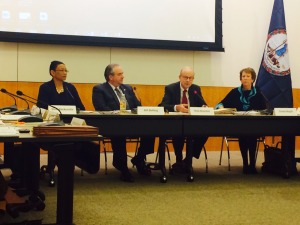Politics, politicians could be greatest hurdle for VA ethics commission

STATE ETHICS: Virginia’s new state integrity commission may have a few obstacles — like a history of politics.
By Kathryn Watson | Watchdog.org, Virginia Bureau
ALEXANDRIA, Va. — For some members of the new governor-appointed ethics commission, perhaps their greatest challenge could be themselves.
Members of the Commission to Ensure Integrity and Public Confidence in State Government, appointed by Gov. Terry McAuliffe, made it clear in their first meeting this week they want to live up to their title. It’s a task perhaps as difficult as the commission’s name is long.
“The public’s trust is very hard to gain. It is very easy to lose,” said former Lt. Gov. Bill Bolling, a moderate Republican who co-chairs the commission along with Democratic former U.S. Rep. Rick Boucher, in the commission’s first meeting this week.
Virginia has long depended on honor as the vehicle for ensuring ethics in government, a practice the September conviction of former Gov. Bob McDonnell and his wife, and job offerings for Democratic Sen. Phil Puckett, have revealed to be insufficient.
“For a long time in Virginia we have talked about the Virginia Way,” Bolling said. “It was a belief that we did things a little bit differently, frankly a little bit better, in Virginia than perhaps were done in some other states. But over the course of the last year or so we all have seen a number of events which have caused a lot of the people of Virginia to question whether or not there really is a Virginia Way anymore, or do we suffer from maybe some of the same challenges here in Virginia that other states have suffered from?”
Over the next year, the commission will propose reforms on Virginia’s gift laws, required disclosures, the oversight and enforcement of those laws, post public-service employment, lobbying laws, judicial selection, the number of consecutive terms a governor can serve and campaign finance laws.
Members, half Republican-leaning and half Democrat-leaning, hope to come up with solid proposals by Dec. 1 so the Democratic governor’s staff can draft legislation in time for the 2015 session.
At some points in their meeting, comments from the politician-dominated commission suggested one of their greatest obstacles in finding reforms for Virginia’s ethics laws by Dec. 1 may be themselves.
During discussion on job restrictions for politicians leaving office, Bolling suggested that political patronage — a practice criticized after revelations that both Republicans and Democrats in Virginia offered Puckett jobs to either stay in or leave his post — isn’t necessarily a bad thing.
Bolling gave a nod to UVA political scientist Larry Sabato’s column in the Richmond Times-Dispatch, “Why it is non-Puckett gate: Politics isn’t a crime.” There’s nothing wrong with offering a job to a qualified friend — but it is a problem when it’s in exchange for something, Bolling said.
“Political patronage has been a part of he process since the beginning of time,” Bolling said.
That’s just the problem with having politicians dominate an ethics commission, and why people have such little confidence in their elected officials, said Richard Kelsey, assistant dean at George Mason University’s School of Law.
“The problem is that it’s transparent now to everyone that jobs are not being offered on merit. They’re being offered on political patronage,” Kelsey told Watchdog.org in an interview earlier this month. “And the political patronage is as old as our country. But it doesn’t make it a good system. So why doesn’t the Virginia Legislature sit down and figure out a better system so we have confidence in our government?”
The integrity commission is also tackling another incredibly controversial task in Virginia — congressional redistricting.
After the U.S. District Court for the Eastern District of Virginia struck down the boundaries of Virginia’s 3rd Congressional District because they concentrate the influence of black voters in one place and dilute it elsewhere, the governor added redistricting proposals as another piece of the commission’s tasks.
“The governor is pursuing a political agenda under the guise of ethics,” tweeted Republican state Delegate Mark Cole after the first meeting.
Christopher Howard, president of Virginia’s Hampden-Sydney College and one of only two black members of the commission, said the topic of redistricting is a vitally “important” one, but including it in the ethics commission’s work is kind of like a Sesame Street game of “one of these things is not like the other.”
Others on the commission recognized it didn’t quite fit the bill, but noted the court has ordered Virginia to come up with different boundaries for the district by spring.
Ultimately, the commission decided to nix the word “nonpartisan” from the description of its objectives for making proposals on redistricting, saying it’s impossible to take parties out of the equation.
In 2015, the commission will also be tasked with considering suggestions for making Virginia’s governor a two-term governor — something Kelsey criticized as having very little to do with the commission’s scope.
Bolling told Watchdog.org the two-term governorship has to do more with general reforms, and is something he has long supported. Virginia, which has one of the most powerful gubernatorial posts in the country, is the only state that still prohibits governors from serving two consecutive terms.
Members of the public can submit comments to the commission online, or address the public commission at the next meeting on Thursday, Nov. 6, at 6 p.m. in Charlottesville.
— Kathryn Watson is an investigative reporter for Watchdog.org’s Virginia Bureau, and can be found on Twitter @kathrynw5.







